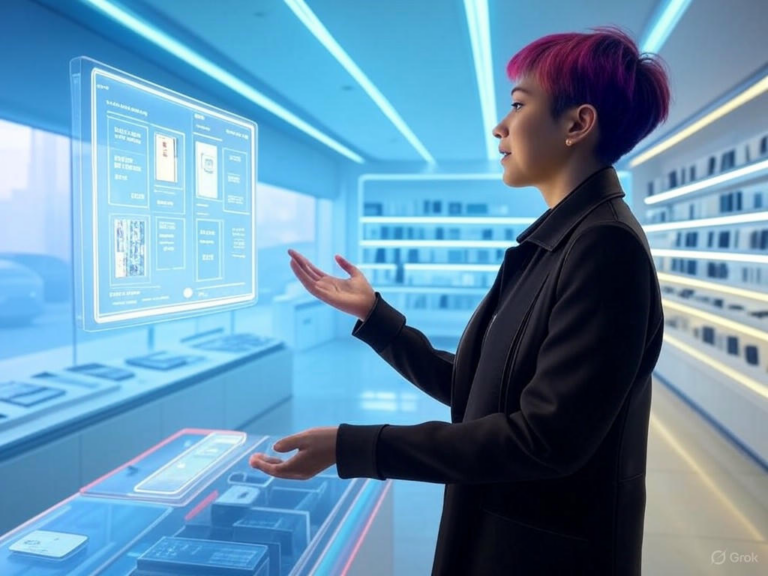
Agentic AI Reshapes Leadership and Org Structures
The Rise of Agentic AI
Agentic AI is rapidly changing the way businesses function, pushing leaders to rethink their roles in a world of smarter, more independent systems. Picture this: traditional AI follows strict scripts, but agentic AI steps up by making decisions on its own, pursuing goals dynamically, and adapting to real-time challenges. This shift is redefining leadership, organizational frameworks, and the pursuit of innovation across various industries, creating opportunities for greater efficiency and ethical growth.
Have you ever wondered what happens when technology starts thinking like a team member? Agentic AI embodies this idea, blending advanced AI capabilities with the ability to act autonomously. As businesses embrace it, leaders must learn to guide these systems while fostering collaboration that amplifies human creativity.
Understanding Agentic AI
At its heart, agentic AI involves systems that plan, decide, and evolve in real time, all while staying aligned with business goals. It builds on breakthroughs from large language models and generative AI, but goes further by handling multi-step tasks, collaborating with other AI entities, and seamlessly fitting into human-driven processes as outlined in Harvard Business Review.
- Autonomy: These systems operate with little oversight, executing tasks and choices independently to keep things moving smoothly.
- Contextual Intelligence: Agentic AI adapts quickly to new situations, ensuring decisions fit the current landscape and priorities.
- Goal Alignment: It focuses on strategic outcomes, moving beyond rigid rules to drive real business value [5].
Why does this matter for your organization? Agentic AI isn’t just a tool—it’s a partner that learns and adjusts, potentially transforming everyday operations into something more proactive and insightful.
How Agentic AI Transforms Leadership
In the age of agentic AI, leadership is evolving from hands-on management to strategic oversight. Leaders now act as conductors, harmonizing human teams with autonomous AI agents that bring their own learning styles and behaviors to the table.
New Leadership Responsibilities in the Agentic AI Era
Gone are the days of simply directing tasks; today’s leaders must curate environments where AI and people thrive together. This means guiding agentic AI to uphold company values and ethics while unlocking synergies that boost innovation.
- Steer AI systems to align with core principles and moral guidelines.
- Build bridges for effective human-AI partnerships, creating outcomes neither could reach alone.
- Hone skills in spotting biases, managing risks, and staying ahead of tech trends [2].
Think about it: How might your role change if AI could handle routine decisions, freeing you to focus on big-picture strategy? This is the reality many leaders are navigating today.
Shifting from Centralized to Decentralized Decisions
Agentic AI is driving a move toward distributed authority, spreading decision-making power across teams rather than keeping it at the top. Supported by AI insights, this approach speeds up responses to market shifts and empowers employees with data-driven tools.
- It cuts down on delays, allowing quicker reactions to changes in operations or the market.
- It enables frontline teams to make smart, informed calls without constant approvals.
- Most importantly, leaders must coach their teams on using agentic AI recommendations wisely and ethically [7].
This isn’t just about efficiency—it’s about building a more agile culture. What if your team could respond to challenges in real time? Agentic AI makes that possible.
Impact on Organizational Structures
As agentic AI integrates into daily operations, it’s reshaping how teams are structured and how work flows. Organizations are seeing a blend of human and machine collaboration that enhances productivity and adaptability.
The Emergence of Hybrid Teams with Agentic AI
Hybrid teams, where humans and AI agents collaborate seamlessly, are becoming the norm. These setups automate mundane tasks, letting people dive into creative and strategic work that demands empathy and insight.
- Boost productivity by handling repetitive duties, giving humans more time for high-value activities.
- Encourage innovation as AI learns and adapts, evolving workflows on the fly.
- Foster a dynamic environment where agentic AI supports real-time problem-solving [2].
Imagine a team where AI flags issues before they escalate—could this be the key to your organization’s next breakthrough? It’s already happening in forward-thinking companies.
Reimagined Process Workflows
With agentic AI at the helm, workflows are becoming more streamlined and responsive. These systems plug into existing tools, automating complex sequences and spotting inefficiencies proactively.
- Streamline operations to save time and resources, especially in areas like supply chain management.
- Identify and fix bottlenecks before they impact performance.
- Offer scalability, allowing businesses to adapt quickly to growth or changes.
Comparing Traditional and Agentic AI Structures
| Dimension | Traditional Structures | Agentic AI-Driven Structures |
|---|---|---|
| Decision-Making | Centralized, hierarchical | Distributed, collaborative |
| Workflow Adaptability | Static, slow to change | Dynamic, responsive |
| Human Role | Execution-focused | Orchestration, supervision, strategy |
| AI Involvement | Tool-based, limited autonomy | Fully autonomous agents, proactive problem-solving |
This comparison highlights how agentic AI flips the script, turning rigid systems into flexible ones that respond to real-world demands.
Leadership Skills for the Agentic AI Era
To thrive, leaders need to develop skills that blend tech savvy with ethical awareness, ensuring agentic AI serves as a force for good.
Governance and Ethical Use of Agentic AI
Ethical governance is crucial; leaders must tackle issues like bias and privacy while overseeing AI performance. Without proper checks, agentic AI could unintentionally perpetuate problems, so proactive measures are essential [7].
Strategic Agility in the Agentic AI Landscape
The fast-paced nature of agentic AI demands agile strategies. Leaders should shorten planning cycles, monitor emerging risks, and cultivate a culture of continuous learning to stay competitive.
- Adopt iterative approaches that respond to AI advancements quickly.
- Encourage teams to embrace change and innovation.
- Foster environments where adaptability leads to sustained success.
Building Human-AI Collaboration Skills
The real magic happens when human intuition meets agentic AI‘s analytical power. Organizations that excel will train their people to use AI insights effectively, creating teams that blend technical skills with creative thinking.
- Provide training to integrate AI data into daily decisions.
- Promote diverse teams that leverage empathy alongside automation.
- Establish feedback mechanisms for ongoing AI refinement.
Best Practices for Adopting Agentic AI
- Build foundational knowledge about how agentic AI works and its potential effects on your business.
- Test ideas in safe, low-stakes areas before expanding them organization-wide.
- Redesign workflows to optimize human-AI interactions for maximum impact.
- Focus on change management to support your team’s transition smoothly.
- Put strong governance in place to monitor and secure AI operations.
These steps can help you implement agentic AI without disrupting your current setup—think of it as upgrading your team’s capabilities step by step.
Real-World Applications of Agentic AI
From supply chains to customer service, agentic AI is delivering tangible results. For instance, in logistics, AI agents predict disruptions and suggest fixes, keeping operations running smoothly.
- Enhance customer interactions by handling routine queries, so human agents focus on empathy-driven support.
- Use AI for personalized coaching, offering leaders data-backed advice for development.
Challenges and Ethical Considerations with Agentic AI
While exciting, agentic AI brings challenges like ensuring alignment with company ethics and addressing job impacts. Leaders must prioritize transparency to build trust and mitigate risks.
- Maintain clear decision processes to avoid opaque AI actions.
- Support workforce transitions through retraining programs.
- Balance innovation with ethical standards to create a sustainable future.
The Future of Leadership in an Agentic AI World
Looking ahead, leadership will increasingly involve guiding agentic AI while emphasizing human qualities like empathy. Organizations that succeed will use AI to amplify, not replace, human potential.
Conclusion: Embrace the Change
It’s clear that agentic AI is here to stay, reshaping how we lead and organize. By developing the right skills and fostering ethical practices, you can turn this technology into a powerful ally. What steps will you take next? Share your thoughts in the comments, explore more on our site, or connect with us to discuss how agentic AI could transform your organization.
References
- Harvard Business Review. “What is Agentic AI and How Will It Change Work?” https://hbr.org/2024/12/what-is-agentic-ai-and-how-will-it-change-work
- Put It Forward. “Agentic AI Leaders.” https://www.putitforward.com/agentic-ai-leaders
- ISG. “Agentic AI: A Strategic Guide for Enterprise Leaders.” https://isg-one.com/advisory/ai-advisory/agentic-ai–a-strategic-guide-for-enterprise-leaders
- IBM. “Agentic AI.” https://www.ibm.com/think/topics/agentic-ai
- Rokk3r. “Agentic AI: How It’s Redefining Work and Leadership.” https://www.rokk3r.com/insights/agentic-ai-how-its-redefining-work-and-leadership
- Advanced Web Ranking. “Agentic AI and Semantic SEO.” https://www.advancedwebranking.com/blog/agentic-ai-and-semantic-seo
- Harbinger Group. “Leadership in the Agentic AI Era: Strategies for Business Success.” https://www.harbingergroup.com/blogs/leadership-in-agentic-ai-era-strategies-for-business-success
- Marketing Data Science. “Agentic AI with R: Building an Automated Website Auditor.” https://blog.marketingdatascience.ai/agentic-ai-with-r-building-an-automated-website-auditor-from-scratch-1a42d0bd7bae
agentic AI, leadership, organizational structure, autonomous decision-making, business transformation, adaptive workflows, ethical challenges, AI agents, hybrid teams, decision-making processes







